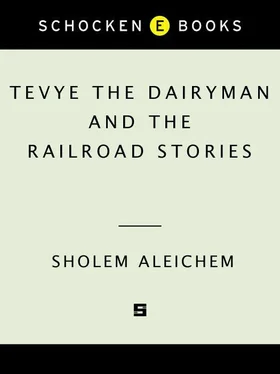3. He can give them only in Hebrew (as in the original Yiddish text).
4. He can omit them entirely.
I have in fact utilized all these approaches. In some places, where a quotation of Tevye’s is neither especially striking nor crucial, and where leaving it out does not adversely affect the tone or the significance of his remarks, I have done so. At a few points in the text I have translated his quotes into English, sometimes retaining the Hebrew as well and sometimes deleting it. In the great majority of cases, however, I have chosen Option 3 and, like the Yiddish text, given only Tevye’s Hebrew, translations of which will be found in the glossary and notes at the back of the book. Though this may be the solution that seems at first glance to be the most inconvenient for the English reader, I preferred it for several reasons.
The first of these is that many of Sholem Aleichem’s Yiddish readers also failed to understand some or all of Tevye’s quotes. Sholem Aleichem had a mass audience, much of it composed of working men and women with little or no religious education, and if they did not mind being stumped by Tevye’s Hebrew, neither need the English reader today.
Secondly, most of the characters in Tevye the Dairyman —in fact, nearly all of them — are simple Jews themselves who complain that they can’t follow Tevye’s quotations, from which they keep begging him to desist. For the English reader to be told what these mean at the same time that Tevye’s family and acquaintances are baffled by them would create a rather odd effect.
Thirdly, translating Tevye’s Hebrew in the text itself almost always results in the wrong tone, since the biblical and rabbinic passages that he cites have an archaic sound in English, which is not at all the case in the original. On the contrary, even when a Yiddish speaker did not know the meaning of a Hebrew verse, the feeling it suggested to him was generally the warm, homey one of religious rituals and synagogue services that he knew well.
Finally, as far as Jewish readers are concerned, modern Jewish history has ironically reversed the composition of Sholem Aleichem’s public. Once he was read by Jews who knew more Yiddish than Hebrew; today he is mostly read by those who, if they know any Jewish language at all, know more Hebrew than Yiddish. It is my hope that many such readers who cannot read Sholem Aleichem in the original will nevertheless be able to enjoy Tevye’s Hebrew wordplay in this English translation.
For those who cannot, there are two consolations. One is the glossary, which the reader is free to consult not only for the meaning and pronunciation of Tevye’s Hebrew quotes, but also for explanations of historical references and Jewish customs that may elude him. The other is the fact that there is no need to skip over the Hebrew quotations just because one does not understand them. Read them aloud; savor them; try saying them as Tevye did. There is no way to reproduce in print the exact sights, smells, and tastes of Tevye’s world, but a bit of the sound of it is in these pages.
Though there is only one Tevye, there was also only one Sholem Aleichem, and, as readers of the twenty Railroad Stories will notice, as prolifically creative as he was (the first posthumous, incomplete edition of his work ran to twenty-eight volumes!) — indeed, it would seem, as a prerequisite for such productivity — there are in his work certain basic themes and situations that occur again and again. Thus, one is reminded by the story “Eighteen from Pereshchepena” of the comic scene between Tevye and Layzer Wolf in which the two carry on a single conversation that each thinks is about something else; by the narrator’s attitude toward women in “High School” of Tevye’s antifemale posturing; by Berl Vinegar’s fast-talking of the priest in “The Miracle of Hoshana Rabbah” of Tevye’s handling of Ivan Paparilo in the pogrom scene of “Lekh-Lekho,” etc. Even Tevye’s rampant quotationism has its parallel in the narrator of “Burned Out”—who, however, is even less of a “scholar” than Tevye and wildly throws Hebrew phrases about without always knowing what they mean. Such recurrent elements served Sholem Aleichem as modular blocks out of which he was able to construct an amazing variety of characters and plots.
Although The Railroad Stories , first assembled in book form in 1911, are contemporary with the Tevye episodes, their composition was not widely spaced like that of Tevye but rather concentrated in two intense bursts of activity, one in 1902 and one in 1909–1910. In the first period were written “High School,” “The Automatic Exemption,” “Burned Out,” “Fated for Misfortune,” and, though it was later slightly revised to form the collection’s closing story, “Third Class.” With the exception of “It Doesn’t Pay to be Good.” which dates from 1903, all the other stories belong to the second period. It was only then, indeed, that Sholem Aleichem decided to write a book of tales all told to or overheard by a traveling salesman on a train, which explains a fundamental difference between the 1902–1903 series and the 1909–1910 one; for in the latter group trains and train rides are generally intrinsic, whereas in the former they are not. The 1902–1903 stories, in other words, were not originally written with railroads in mind, to which they were adapted after the fact by the simple device of adding a brief descriptive opening paragraph placing them on a train. As for the order of the stories in the book, it was determined by Sholem Aleichem himself. While it does not strictly reflect the sequence in which they were written, it does have a chronological basis, the first eleven tales dating from 1909–1910, the next five from 1902–1903, and the next three from 1909–1910 again.
Like Tevye , nearly all The Railroad Stories are monologues; this was Sholem Aleichem’s favorite form and one he repeatedly returned to. At first glance it may seem that the traveling salesman who records them is a more active party than the Sholem Aleichem who merely listens to Tevye, since he describes what he sees and occasionally participates in the conversation — yet this is but one side of the coin. Though Sholem Aleichem never speaks to Tevye, Tevye is always conscious of speaking to Sholem Aleichem; his idea of the educated, cultured, sophisticated author he is talking to colors all that he says, and more than once he insists that he would never confide such things to anyone else. The commercial traveler of The Railroad Stories , on the other hand, is simply someone to whom his fellow passengers can tell their tale, at times revealing to the book’s readers aspects of themselves that he himself is naively unaware of. (Such as the fact, for example, that the “Man from Buenos Aires” is really a rich pimp engaged in the white slave trade, the shanghaiing of girls to Argentina to work as prostitutes there.) Who he is does not interest them in the least. A Jew meets another Jew on the train and straightaway begins to talk about himself.
Nevertheless, though the notion of trains running through Russia with almost no one in their third-class cars but Jews who tell each other stories may seem like an artificial literary convention, this is actually not the case. The Russia of Sholem Aleichem’s day, especially in the provincial Pale of Settlement, had a relatively small Christian middle and lower-middle class. The great bulk of the population belonged to either the peasantry or the landed aristocracy, and of the two groups, the first rarely traveled, and the second never traveled third class. Jews were often merchants, but mostly petty ones who preferred to travel as cheaply as they could — and the fact that Jews, when traveling, tend even today to talk nonstop to each other is something that can be vouched for by anyone who has ever taken a crowded flight to Israel.
Читать дальше












